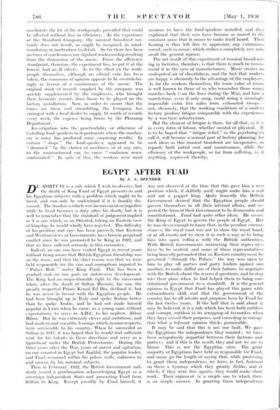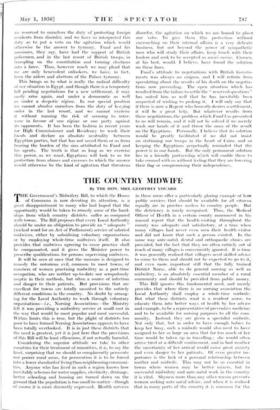EGYPT AFTER FUAD
By J. A. SPENDER Indeed, no one can have visited Egypt in recent years without being aware that British-Egyptian friendship was on the wane, and that the chief reason was that we were held responsible for the sins and corruptions imputed to " Palace Rule " under King Fund. This has been a gradual, and, on our part, an unforeseen development. The King had an unquestionable right to the succession when, after the death of Sultan Hussein, his son, the greatly respected Prince Kemal Ed Din, declined it, but he was never in favour with the Egyptian people. He had been brought up in Italy and spoke Italian better than he spoke Arabic, and he had not made himself popular in Cairo when he came, as a young man without expectations, to serve as A.D.C. to his nephew, Abbas Mimi. But he was extremely clever and ambitious, and had modern and scientific leanings which, in some respects, were serviceable to his country. When he succeeded as Sultan in 1917, it was hoped that he would find sufficient vent for his talents in these directions and serve as a figurehead under the British Protectorate.. During the three years after the War, years of unrest and agitation, no one counted in Egypt but Zatghlul, the popular leader, and Fund remained within his palace walls, unknown to and unseen by his nominal subjects.
Then in February, 1922, the British Government sud- denly issued a proclamation acknowledging Egypt as a sovereign independent State and promoting Fuad from Sultan to King. Except possibly by Fund himself, it was not observed at the time that this gave him a new position which, if skilfully used, might make him a real and not a puppet king. Quite honestly the British Government desired that the Egyptian people should govern themselves in all their internal affairs, and ex- pected the form of their Government to be democratic and constitutional. Fuad had quite other ideas. He meant the King of Egypt to govern the people of Egypt. But he was clever enough to know that, in the peculiar circum- stances, the royal road was not to show the royal hand, or at all events not to show it in such a way as to bring him into open collisicn with the British authorities. With British Governments instructing their represmta- tives to be neutral, and some of these representatives being honestly persuaded that an Eastern country must be governed " through the Palace," the way was open to him to play off parties and party leaders against one another, to make skilful use of their failures to negotiate with the British about the reserved questions, and to step into their place when he had helped them to bring con- stitutional government to a standstill. It is the general opinion in Ejypt that Fuad has played this game with extraordinary skill, and that the government of the country has to all intents and purposes been by Fund for the last twelve years. If the half that is said about it may be believed, it is a rule which has been both ruthless and corrupt, ruthless in its scrapping of favourites when they have served their purposes, and exceeding in corrup- tion what a tolerant opinion think; permissible.
It may be said that this is not our fault. We gave the Egyptians the independence they wanted ; we have been scrupulously impartial between their factions and parties ; and if this is the result, they and not we are to blame. This is not the Egyptian view. The great majority of Egyptians have held us responsible for Fund, and many go the length of saying that, while professing to grant them independence, we have, in fact, fastened on them a tyranny which they greatly dislike, and of which, if they were free agents, they would make short work. Their argument is a simple one to.. which there is no simple answer. In granting them independence we reserved to ourselves the duty of protecting foreign residents from disorder, and we have so interpreted this duty as to put a veto on the agitation which would otherwise be the answer to tyranny. Fuad and his nominees, they say, have had the support. of British policemen, and in the last resort of British troops, in trampling on the constitution and turning eleetipns into a farce. Thus, however much we may plead that we are only benevolent onlookers, we have, in fact, been the eiders and abettors of the Palace tyranny.
This brings us to what is really the radical difficulty of our situation in Egypt, and though there is a temporary lull pending negotiations for a new settlement, it may easily arise again, and under a democratic as well as under a despotic regime. In our special position we cannot absolve ourselves from the duty of kc eping order in the last resort, and we cannot exercise, it without running the risk of seeming to inter- vene in favour of one regime or one party against its opponents. It has been the fashion in recent years for High COMmissioner and Residency to wash their I:ands and declare an absolute neutrality between Egyptian parties, but that has not saved them or us from bearing the burden of the sins attributed to Fuad and his agents. The truth is that so long as we exercise this power, as we must, Egyptians will look to us for protection from abuses and excesses to which the answer would otherwise be the kind of agitation that threatens disorder, the agitation on. which we arc bound to place our veto. To give them this protection without encroaching on their internal affairs is a very delicate business, but not beyond the power of sympathetic men who will study their affairs, keep touch with their leaders and seek to be accepted as amiei curiae. Cromer, at his best, would, I believe, have found the solution on these lines.
Fuad's attitude to negotiations with British Govern- ments was always an enigma, and I will refrain from speculating about the results of his death on the negotia- tions now proceeding. The open situation which has resulted from the failure to settle the " reserved questions" has suited him so well that he has inevitably been suspected of wishing to prolong it. I will only say that if there is now a Regent who honestly desires a settlement. it will be a great help. But whatever results from these negotiations, the problem which Fluid has presented to us will remain, and it will not be solved if we merely wash our hands of it and throw the onus of the result on the Egyptians. Personally. I believe that its solution would be greatly fiwilitated if we did not insist on stationing our troops in the heart of Cain), and so keeping the Egyptians perpetually reminded that the power is in our hands. But the only permanent solution lies in a friendly partnership which will enable them to take counsel with us without feeling that they are lowering their flag or compromising their independence.















































 Previous page
Previous page